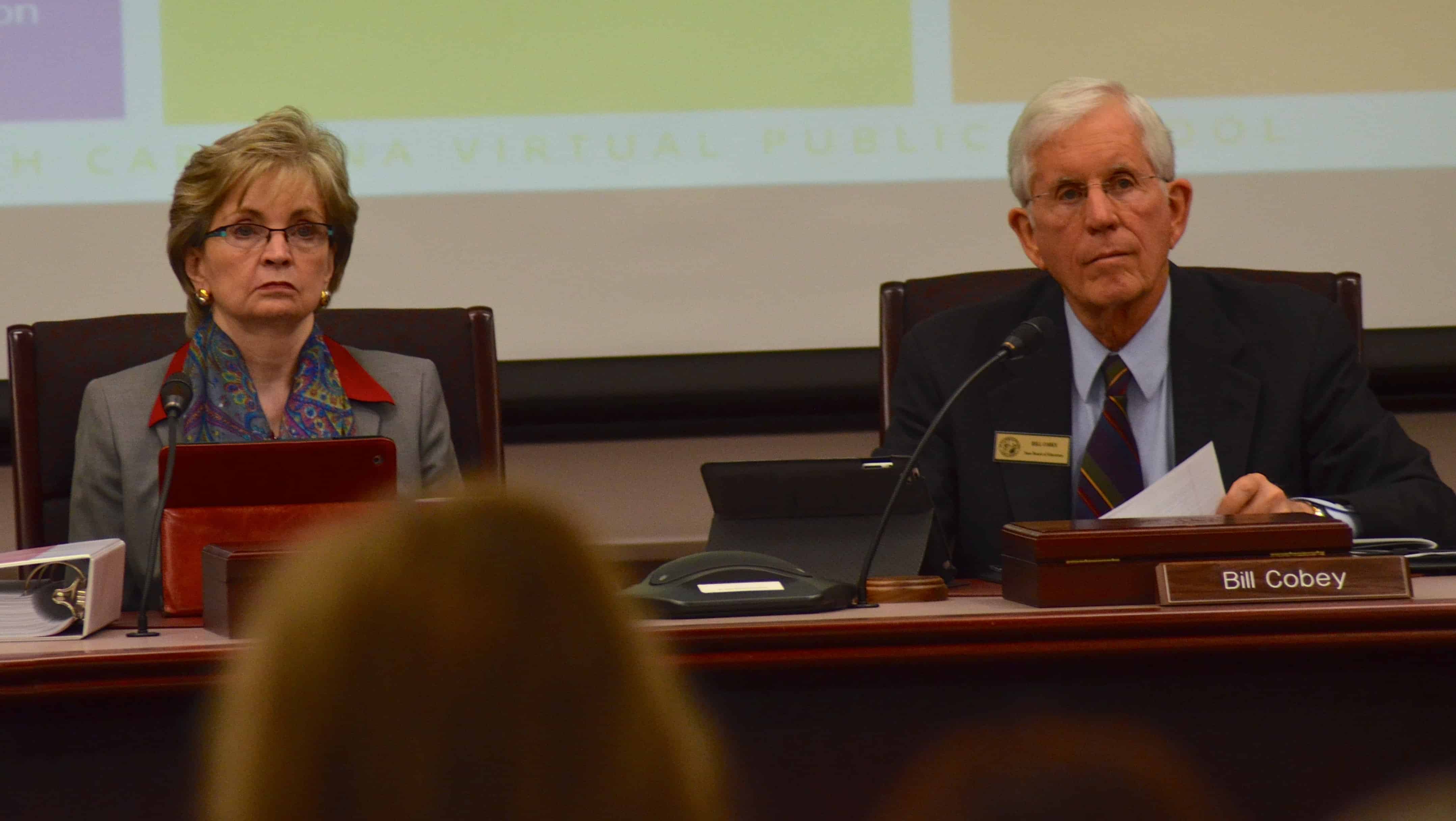Just days after a key North Carolina charter panel recommended sweeping changes to how State Board of Education (SBE) members hear charter school applications, state board Chairman Bill Cobey said charter advocates aren’t likely to get their way on at least one major point.
Cobey spoke to Policy Watch this week, four days after members of the Charter School Advisory Board (CSAB) suggested prospective charters approved by at least 75 percent of the panel be tucked into the state board’s consent agenda.
That’s an important recommendation because, as it stands today, charter applications are heard and voted on a case-by-case basis on the SBE agenda. The consent agenda, however, is typically reserved for non-controversial items and may be approved by the board in one vote with little to no public discussion.
On Monday, Cobey said that, while he can’t speak for the entire state board, he will not back such a policy.
“They certainly can recommend anything they want to,” said Cobey. “But we’re going to set how we handle things.”
Cobey pointed out final responsibility for charter schools’ approval or rejection resides with his board, as does the credit or blame if a charter succeeds or fails.


“Clearly, we cannot delegate that responsibility to an advisory board, as much as we appreciate their work,” he said.
The application proposal was one of several put forth by CSAB members last week, including a recommendation that applicants rejected by the state board be sent back to the CSAB for further refining, rather than being forced to restart an application process that could take months or even years in some cases.
The proposals surfaced weeks after the State Board of Education surprised many in August by rejecting five applicants backed by the charter advisory board.
All told, the state board approved just eight of a prospective 28 new charters, a reversal for a board that has signed off on dozens of new charters since North Carolina lifted its 100-school cap in 2011.
The votes came at a time of seemingly elevated state scrutiny for charter applications after a staggering 15 charters across the state crumbled in the last five years, most due to financial instability and lagging academics.
Cobey told Policy Watch in August that his board has had to “live with those failures.”
That’s why Cobey said it’s important for the state board to closely weigh applications, even with the support of the CSAB, which is appointed by the N.C. General Assembly, Gov. Pat McCrory, and Lt. Gov. Dan Forest.
CSAB members typically boast experience working with charters, and many remain active industry leaders today. Still, state board members typically heed the advise of the CSAB, which offers counsel on charter policy as well.
But when state board members voted against the CSAB’s recommendations in August, they suggested there were myriad inadequacies in the applications, including typos and insufficient academic plans.
The rejections inspired heated criticism from charter backers, including a blistering email from CSAB member Alan Hawkes to Policy Watch in August in which he referred to state board members as “no-nothings” and “soulless SOBs.”
Hawkes, an outspoken charter leader from Greensboro, later apologized for the comments, but CSAB members resumed their criticism of the charter application process this month when they called for multiple policy changes.
CSAB members also criticized their own panel for sending along applications to the state board bundled with noted critiques, even in cases where the CSAB voted to approve a charter.
“It ended up hurting some really good schools that we approved,” CSAB member Tony Helton told Policy Watch Tuesday.
In addition to his CSAB duties, Helton is chief operating officer of TeamCFA, a national network of publicly-funded charters which operates 10 schools in North Carolina.
Helton said he worries the state board’s inspection of potential charters is “less methodical” than his board.
“The majority of the (CSAB) still believes these applications were very strong,” added Helton. “We need to get that information to the State Board of Education, and maybe that’s a shortcoming on our part.”
Still, Helton said this week that he will not support talk of a consent agenda designation for charter applications, an idea that’s likely to rile charter school critics.
“I think that any move to lessen accountability and oversight of any schools, particularly new schools like charter applications, is a bad idea,” said Keith Poston, president and CEO of the Public School Forum of N.C., a nonpartisan, education policy group in Raleigh, Wednesday.
Poston said the state board has important regulatory powers, and that such power should not be left solely to an advisory panel like the CSAB stocked with charter industry officials.
“That doesn’t seem like the same group that ought to make the final decision to approve their own schools, which is what it sounds like they’re asking more or less,” said Poston.
The state board’s power in the application process is somewhat unusual. Indeed, the nonpartisan National Association of Charter School Authorizers, which advises states on best practices for the charter sector, recommends multiple oversight panels for new charters, pointing out many states delegate authorizing powers to both state and local boards.
It’s a point that has seemed to chafe legislative leaders in recent years, some of whom have pushed efforts to check the state board’s oversight.
As it is though, Helton said the CSAB understands today that final say on charters remains with the State Board of Education.
“I know the pecking order,” Helton said. “All I can do is try to work with them.”
Poston adds that charter proponents, charter critics, and most importantly, students benefit from a strong vetting process. After all, he says, lessening public scrutiny for prospective charters would likely diminish the quality of new schools.
“The sure-fire way to crater charter schools is to begin rubber-stamping charter schools and limit oversight and transparency.”
Editor’s Note: This article was originally published by NC Policy Watch on October 20, 2016.



